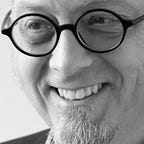A Year After “the Event” — W Lance Hunt
A New Yorker looks at how his life and his city have changed a year after 9–11
(Adapted from, vol 26 The OHIO STATE Alumni Magazine, September 2002)
A year after 9–11, I think of it as “the Event.”
I worked only a six-minute walk from the World Trade Center. I watched the buildings burn, and later, in my office, felt them collapse with a deep, shuddering rumble. I walked three hours home to Brooklyn, dust clinging to the edges of my mouth, nose, and eyes.
For the two weeks, my office was closed, I holed up in my apartment, smelling the stink of burn, listening to fighter jets over the city, hearing sirens, and wondering if they heralded some new disaster.
I was glad to return to my office. It gave me something other than doom, anger, and sorrow to think about. But living in New York, you cannot miss the Event. Memorials are everywhere.
Police officers wear black tape over their badges. Fire engines bear the Star and Stripes.
On a bus, I see a woman in a T-shirt emblazoned with a picture of her lost husband. I overhear a story of how a co-worker’s husband was on the 91st floor and how she watched, screaming, as the towers collapsed on TV. The owner of the restaurant where I now work showed me a photo of three brothers from Windows on the World: the one who started his vacation on Sept. 10, the one who had gone back to Ecuador a few months earlier, the one who showed up for work that day.
Me? I only lost my dot com job the following November, and I took the opportunity to discover what I really wanted to do. After a month, I decided to go back into the restaurant business and become a sommelier.
What is important is not what l decided but that I could decide at all, for that means I have a future.
And it is our future, this construct of our minds, that the Event most severely damaged.
I have discovered that the battle is not only in the Mideast, nor merely against the people dedicated to violence as the solution to their misery. The mêlée in my mind-in everyone’s mind-is equally important.
Life in New York is back to normal — except for one thing: the jarring thoughts of what might happen.
I now spend three hours a day on a train, traveling to my job as a restaurant manager. I wonder: Will my train be a target for the next arrack? What will the weapon be? Sarin gas? A bomb?
When such thoughts thrust themselves into my mind, I read my book more intently. If the train stops between stations, I start to become alarmed. What has happened now? I look at the people around me and wonder if they’re the last people I will ever see.
For several months, there were times when I would feel dislocated. It was as if I were watching reality rather than living it as if there were a layer of something between me and the world.
At times, panic would strike so deep, and I would feel as if l would decompose as I walked down the street†. Other times, I was overwhelmed by a sense of doom, of a future not worth living.
Here the subtle battle I fought-the battle to stop such thoughts, to be calm, to touch reality, to imagine a future not of doom but of possibility.
New York is still New York. It’s a rough town of tough people. It’s big, bad, and beautiful, full of energy and life. People walk about, eat, drink, party, study. I see babies in strollers and families celebrating birthdays.
Yet, low-flying planes send a chill of dread through me, a hesitation as I wait for the sound of an explosion. A rumbling of a truck or train through the ground can still fill my gut with ice.
When that happens, I bury myself in my book, or turn the music up a notch, or walk a bit faster.
Like all of us, I am simply trying to recapture what I had before I stepped out of the subway the morning of Sept. 11, 2001 — the sense that l have a future and that it will be okay.
W lance Hunt ’86, ’86 (LM) of New York City wrote in the November 2001 issue of his experiences on Sept. 11. The original version of that, My Small Story, can be read here.
† Three years after I wrote this, I found out that this feeling was physical, not emotional, caused by temporal lobe seizures from a medial fossa meningioma. But that is a story for another time.
Originally published at https://wlancehunt.com on October 13, 2020.
